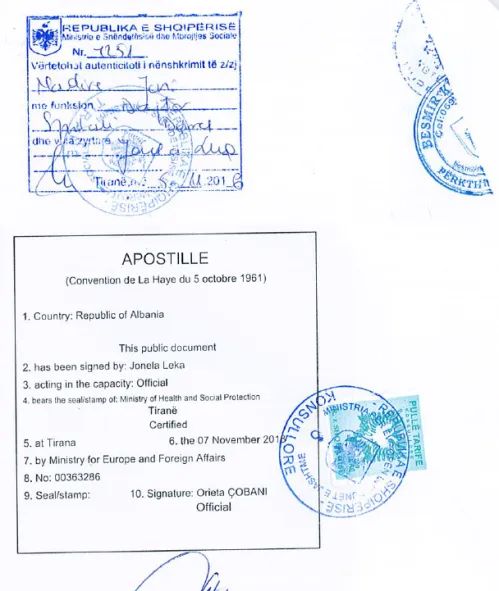
Schmidt & Schmidt covers the full spectrum of legalization services for documents issued in Albania.
Albania joined the Hague Convention on the Simplified Authentication of Documents on 3 September 2003; the Convention entered into force on 9 May 2004.
The apostille, or the “Hague apostille” is a certificate that authenticates the origin of a public document (e.g., a birth, marriage or death certificate, a judgment, an extract of a register or a notarial attestation). It confirms the authenticity of the signature and the authority of an official who signed the public document.
Documents issued in Albania are certified with an apostille in accordance with the Hague Convention of 1961 are recognized in all Member States of the Hague Convention and do not require any other form of certification, such as consular legalization, which considerably reduces the costs and time required for the certification of documents. So far, more than 120 states have joined the Convention.
The apostille is not sufficient for use in the states that are not party to the Hague Convention. In this case, consular legalization applies to a public document.
Designated Competent Apostille Authorities in Albania
Albania is a member of the 1961 Hague Convention, which means it is an apostille country and requires Apostille certification for document authentication. The Office of Authentications, located within the Consular Department of the Ministry of Foreign Affairs, serves as the designated Competent Authority in Albania for issuing apostilles.
The cost of obtaining an apostille varies depending on the type of document. For Albanian documents, the fee is 200 lek, which is approximately 1.6 €. As for foreign documents, the pricing is based on reciprocity, meaning it may vary depending on the specific country and document being authenticated. However, due to the complexity of the process all applicants are advised to send documents through a competent agency/service provider.
The apostille in Albania is a square stamp in Albanian with the obligatory heading "Apostille" and a reference to the 1961 Hague Convention in French (Convention de La Haye du 5 octobre 1961). The apostille certificate’s sides will be at least 9 centimeters long.
Types of documents

| Can be apostillized | Cannot be apostillized |
|---|---|
|
|
Specific aspects and document requirements for the apostille in Albania
Albania is among the 120 countries that recognize and issue apostilles in accordance with the Hague Convention of 5 October 1961. The apostille serves as a confirmation of the official status of a document.
The Albania Apostille Procedure involves essential steps for document legalization. For Educational Certificates, it includes notary pre-authentication, authentication from the State HRD, and apostille from the Ministry of External Affairs. Non-Educational Certificates require notary pre-authentication, authentication from the State Home Department, and apostille from the Ministry of External Affairs. Commercial Certificates need authentication from the Chamber of Commerce and apostille from the Ministry of External Affairs.
Document requirements that might apply in Albania
To obtain an apostille for a document in Albania, the following requirements generally apply:
- The document must be an original or a certified copy issued by the competent authority.
- The document should contain all relevant and accurate information.
- The document must be in the official language of the issuing country or translated into the official language of the country where the apostille is sought.
- The apostille must be affixed by the designated competent authority in accordance with regulations.
The apostille is issued in a uniform format. In Albania, it has the form of a printed sticker with a handwritten signature of an official, an official seal, and a hologram.
In cases where apostilles are not recognized, holders of foreign documents will need to legalize them instead. However, If the country of destination of the document recognizes and issues apostilles, then legalization is unnecessary.
Legalization of Albanian educational documents for use abroad
Obtaining an Apostille for Degree Certificates in Albania involves an authentication and legalization process to establish their genuineness and legitimacy. The documents are initially authenticated by the Notary and HRD, followed by legalization and Apostille stamping by the MEA. If you require the legalization of your document by the relevant authorities, you can rely on our services. We are committed to providing exceptional document collection, scrutiny, and delivery services for required documents and visa applications. With our simple and efficient process, you can effortlessly obtain a sticker on your certificate, ensuring its legal usage without any hassle.
Educational documents issued in Albania, such as school reports, university degree certificates, transcripts of records, enrollment certificates and other certificates from schools or universities are not effective abroad until they are certified with an apostille. For example, an apostille for your foreign degree may be required to apply for a Master's or a PhD degree program.
Recognition of the authenticity of public documents within the EU
Albania has concluded bilateral agreements with:
- Hungary, Czech Republic, Romania, Russia, Bulgaria and Slovakia, which means documents from these countries are accepted directly without the need to be legalized or apostilled.
Regulation on public documents (EU) 2016/1191 of 6 July 2016
Furthermore, Regulation (EU) 2016/1191 of 6 July 2016 on public documents simplifies the circulation of certain public documents that must be presented in an EU Member State and have been issued in another EU Member State, thus exempting public documents from the confirmation of authenticity with the Apostille with the aim of reducing administrative burden and costs for citizens.
Consular legalization of Albanian documents for use abroad
Consular legalization is the process of authenticating or certifying a legal document so a foreign country's legal system will recognize it as with full legal effect that is carried out by the diplomatic or consular mission of the country in which the document is to be used.
Consular legalization is more complex, time-consuming and costly than the simpler apostille procedure. Whereas apostille is usually issued within one step, consular legalization requires several pre-certifications before a public document can be certified at the embassy or consulate of the destination country.
It is a common requirement that the document has to be translated into the official language of the destination country before submission to the embassy. It is up to the diplomatic mission to decide about the authentication procedure.
The main differences between an apostille and consular legalization of documents
The common feature between apostille and consular legalization is that they authenticate an official document for presentation to institutions in another country. However, they have many differences.
| Apostille | Consular legalization | |
|---|---|---|
| Legal effect | Can be used in all countries that are party to the Hague Convention on the Simplified Legalization of Documents. | Use between States one or both of which is not a member of the Hague Convention, or where one of the contracting States has protested the accession of the other. |
| Difficulty | Moderate. To obtain an apostille, contact the competent apostille authority of the state of origin of the document. | High. For consular legalization, various inland authorities and a diplomatic mission of the state of destination must be involved. |
| Pre-certification | Usually not required. | Is obligatory. |
| Attestation at the state of destination embassy in the state of origin of the document | No need to contact the Consulate of the country of destination. | Is the final step of legalization. |
Apostille and consular legalization in all cities of Albania
Schmidt & Schmidt provides apostille and consular legalization services for public documents originating from all regions across Albania. We handle the entire process, from document review to obtaining the necessary certifications, ensuring that your documents are valid and recognized internationally. With our reliable services, you can confidently use your Albanian public documents abroad.
Procurement of documents from Albania
If the important documents are lost or damaged, or current copies of the documents are needed, the re-issue of the documents is required. It is not unusual for people outside Albania to encounter difficulties with obtaining new documents when abroad. Our consultants will help you procure new documents from Albania remotely, and we can arrange for your documents to be sent by courier anywhere in the world.
Certified translation of documents from Albania
Copies and transcripts of civil status documents can be translated into any language by a sworn translator in Albania or the translation can be done in the country of destination. We offer certified translations of civil status documents with further certification. The cost of the work is calculated according to the volume of the document in question.
Does the translation have to be apostillized?
Any foreign document issued in one country and used in another country must be legalized for use abroad. Therefore, the authenticity of a certified translation from Albania needs to be certified by an apostille. Consequently, many authorities may not accept certified translations from Albania if the translation has not been properly authenticated in Albania for use abroad. To avoid this confusion, translations should better be made in the state of the destination of the document.

























































